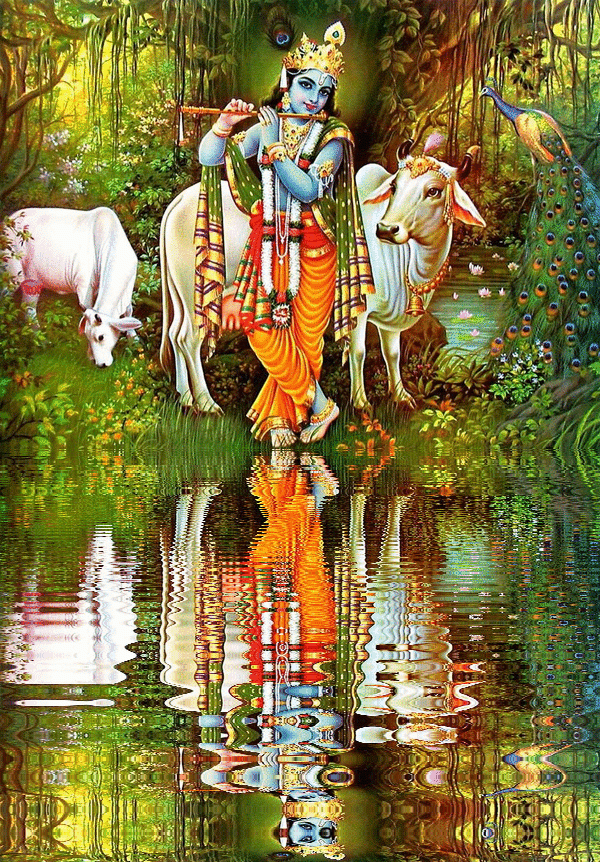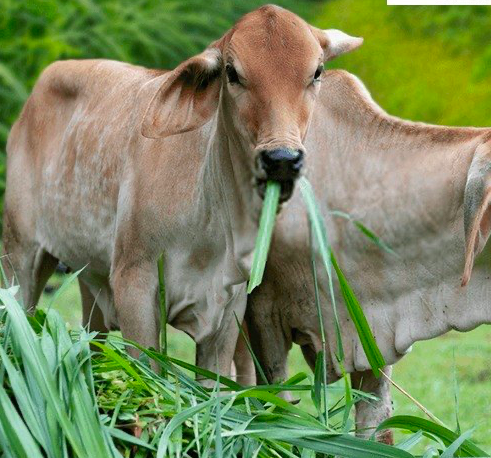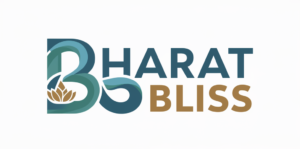Gau Seva - Govind Seva
Located near Chhatikara-Govardhan Road, on the outskirts of the holy town of Vrindavan, The Bharat Bliss Gaushala supports more than 100 cows by providing fodder, shelter and medical care for them daily. We Milk Cows Only Once In A Day That Too In Minimal Quantity Which Is Left After Feeding The Calf. The Residual Milk Is Then Provided To Temples For Bhog And Abhishek.
If You Live In A Place Where You Cannot Maintain Cows Personally, You Can Engage In Gau Seva By Adopting Any Of Our Resident Cows, Bulls Or Calves Or Sponsor Any Of The Offering Given Below And Experience Nirmal Anand From This Blissful Seva.
Come, Join Us To Make The Lives Of These Lovely Beings Better!

SPONSOR FOR COW FODDER
- 1 Time Fodder A Day ………………………………… Rs. 5100/-
- Fodder For 1 Day ……………………………………… Rs. 12000/-
- Mustard Cake (Sarson Ke Khar) 65kg Bag…..Rs. 2200/-
- Barley Flour (Jau Ka Aata) 50 Kg Bag…………Rs. 1200/-
- Cotton Seed Cake (Binola Khali)40 Kg Bag…Rs. 1450/-
- Cotton Seed (Binola) 60 Kg Bag……………….…Rs. 3600/-
- Chana Ki Chunni- 50 Kg Bag……………………….Rs. 1800/-
- Wheat (Daliya) 100 Kg Bag………………………….Rs. 2100/-
- Salt (Namak)100 Kg Bag………………………….…..Rs. 800/-
- Alum (Fitkari) 25 Kg Bag………………………………Rs.1000/-
- Cereal Grain (Chokar) 50 Kg Bag …………………Rs.1100/-
- Jaggery (Gur)20 Kg…………………………………….…Rs.800/-
- Cow Food (Pashu Aahar) 50 Kg Bag…………….Rs. 1200/-

Fodder Is Any Agricultural Foodstuff Used Specifically To Feed Domesticated Livestock, Such As Cows. Most Animal Feed Is From Plants, But Some Manufacturers Add Ingredients To Processed Feeds That Are Of Animal Origin.
Raw Materials For Making Dairy Cattle Feed Pellets
- Cereals: Maize, Barley, Oat, Wheat, Triticale, Rye And Sorghum.
- Seed From Oleaginous Crops: Soy, Flax, And Sunflower.
- Seed From Legumes: Broad Beans, Field Bean And Protein Pea.
- Forage: Flours Of Permitted Forage Essences.
- Dried Beet Pulp.
Concentrates And Feeds With A High Content Of Nutritional Substances. Carbohydrate Feeds Include Cereals (Such As Oats, Barley, And Corn), Which Are Rich In Starch And Sugar; Mill By-Products (Bran, Grain Cuttings, Flour Dust); And Dried By-Products Of Sugar-Beet And Starch Production
Calves Are Adapted To Grass; So Long Stem Hay For The First 3-7 Days Is A Normal Recommendation. Calves Usually Prefer A Dry Grain Mix At First, But Will Quickly Adapt To High Moisture Feeds, Including Corn Silage Over A 1-2 Week Period.
In Early Weaning Systems Calves Need To Begin Eating Some Grain By 2 Weeks Of Age To Allow Enough Rumen Development To Occur Before Weaning At 5 Or 6 Weeks Of Age. If We Do A Good Job Of Managing Grain Intake, It Is Possible To Wean Calves At 6 Weeks, Even When Milk Feeding Rates Are High.
Calves Should Be Fed Daily Approximately 10% Of Their Body Weight (1 Quart Of Milk Weighs 2 Pounds). For Example, A Gir Calf Weighing 90 Pounds At Birth Would Be Fed 4.5 Quarts (9 Pints) Of Milk Daily Or 2.25 Quarts Per Feeding When Fed Twice Daily.
ADOPTION PROGRAM
- Adopt A Calf For 1 Month ………………………….……Rs.1100/-
- Adopt A Cow For 1 Month …………………………..…..Rs.5100/-
- Adopt A Bull For 1 Month ………………………………..Rs.6000/-
- Adopt A Calf For 1 Year …………………………………Rs.12000/-
- Adopt A Cow For 1 Year………………………………….Rs.51000/-
- Adopt A Bull For 1 Year……………………………..….Rs.60000/-
- Life Time Adoption Of A Cow From Birth….…Rs. 200000/-
- Life Time Adoption Of A Bull From Birth….…Rs. 300000/-
- 1 Cow Medical Expenditure For 1 Year (Avg.)….Rs.500/-
- Medical Expenditure Per Month (Avg.)………….Rs. 6000/-
- Medical Expenditure Per Year (Avg.)………..…..Rs.75000/-
How cow as an animal is beneficial to the society?
Cows or cattle are the most useful domestic animals. They benefit the humans and the environment in many ways that we fail to recognize or appreciate. They are raised as dairy animals for milk and other dairy products and as draft animals. Cow dung is also used as fuel all over the country. Cattle in India has significant religious connotation as well.
Cow, in India, provides us with the entire requirement for our farming activities in Agriculture. It helps us in transportation of our goods, works in our agricultural lands. It gives us the medicine; it saves the crop from pest, insect and fungi. In many rural areas, cow is also kept as pet providing with benefits.
Benefits of Cow milk and ghee:
- It is believed, Cow Ghee helps in the growth and development of Children’s brain
- Regular consumption increases good (HDL) cholesterol (and not bad LDL cholesterol)
- Helps in improving digestion and absorption of fat soluble vitamins
- An all round anti-ageing vegetarian food & external applicant on the skin
- It helps in making teeth and bones strong
- Good heart health
- Prevention from Diabetes
- Complete protein helps in growth and development of the human body
- Boosts up the immune system
After mother’s milk, it is only the cow’s milk which gives energy and full protection and is digestible. It is the primary animal milk consumed by the humans. Cow milk is like nectar, because it has amino acids which make its protein easily digestible. It is good for kidney. It is a rich source of Vitamins like B2, B3 and A which help increasing immunity. Cow Milk helps in reducing acidity and chances of peptic ulcer. It also helps in reducing chances of colon, breast and skin cancer. Cow milk also prevents the formation of serum cholesterol. It is one of the best natural anti-oxidants.
Benefits of cow dung and urine:
- Organic fertilizers- For soil enrichment
- Pesticides
- Fungicides
- Insecticides
- Biogas- Fuel for cooking and to produce electricity
- Anti-bacterial property- Used to protect walls and floors of houses in the villages.
